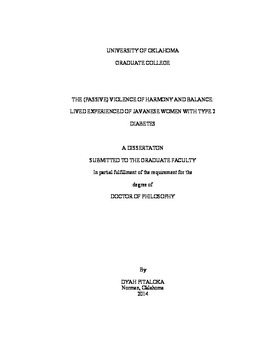| dc.description.abstract | This study is an examination of Javanese women’s lived experience with Type 2 diabetes, an exploration of the ways these women maintain interactions with family members and society and how they adapt diabetes management to Javanese cultural beliefs and traditions. Through participant’s narratives, this study provides a new conceptual understanding of diabetes and how submission to culture becomes an opportunity for these women to re-construct their identities and manage their disease and their obligations. This study includes data collected through in-depth interviews and observations, which were analyzed using narrative analysis. A total of 60 Javanese women with Type 2 diabetes participated in this study. These women are from middle class and poor socio-economic groups, and reside in urban and rural areas of Central Java, Indonesia. Through the interviews, the influence of cultural beliefs related to Javanese women’s health beliefs, and their roles in maintaining harmonious social interactions and obligations are examined, along with issues of self-image and identity formation. Narrative analysis was conducted to analyze individuals’ stories and the socio-cultural meanings embedded in the stories. Further, in the analysis, women’s narratives are used to capture shared socio-cultural values that shape Javanese women’s identities and their understandings about diabetes. The analysis reveals that harmony and balance are main themes in women’s stories of their lived experiences with Type 2 diabetes. Principles of balance and harmony emphasize individuals’ abilities to manage disruptions in their lives using specific cultural resources, and attaining balance and harmony, participants say - is required for even constitutive of good health. The author concludes that the prominence of balance and harmony in the narratives indicates that these two obligations substantially affect Javanese people’s worldview, providing a fundamental structure for understanding conceptual thinking about disease, health, cures, and ways of managing Type 2 diabetes. More specifically, diabetes challenges harmony and balance on three different levels: the personal level, the familial level, and the social level. Within these levels, participants emphasize the importance of achieving “fit” through submission to Javanese cultural values, especially tepa selira (empathy). | en_US |
